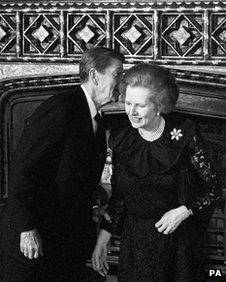The lessons and warnings from 1983 archive
- Published
The documents, from 1983, have been released under the 30-year rule
It is tempting to read the newly declassified government archives from 1983, external like a well-plotted detective novel.
Look close enough at the clues, and you can work out the conclusion.
Margaret Thatcher rips into a paper by her then Foreign Secretary Geoffrey Howe.
It is dreadful, she says, adding: "If it came to us from a friendly power I should tear it apart."
Come the final chapter of this story, the mild-mannered Howe will surely have his revenge, external.
A minister warns Mrs Thatcher that her local government reforms are "going to cause the government lots of trouble over the next few years". He isn't wrong.
They lead, in the end, to the Poll Tax, and the riots that preceded her resignation, external.
Then there are the firm plans for the future; the preparations for privatisation and for the miners' strike to come.
The prime minister considered using troops, began converting power stations so they could be switched to run on oil, and drew up plans to buy land where coal could be stockpiled.
'Downright dishonest'
But you can also read the archive as a mirror of our current concerns. There is much there that sounds familiar.
A prime minister tries to tackle spending and her ministers resist.
Heseltine 1983
Cuts would send "the wrong signal to friends and adversaries alike" complains Francis Pym, the man who was her foreign secretary before the 1983 election.
The prime minister's head of press, Bernard Ingham, despairs over press coverage of the government's efforts. It is, he says, "over-simplistic, confused, false or downright dishonest".
And even as they plan the cuts, politicians fret about a proposal for a huge hike in MPs' pay.
Disappointing perhaps for journalists looking for neat forecasts and clever analogies though, the reality behind the documents is complicated and messy.
Lord Heseltine, the then defence secretary who was to have his own spectacular fall out with the prime minister, external says: "She treated Geoffrey (Howe) often extremely badly."
But as he notes, all prime ministers store up resentments among their colleagues. Some, like him, simply developed their own ways of getting heard.
Diplomat-speak
"You just waited till she drew breath and you started again and then she'd do it again and you waited until she drew breath and you started again," he says.
"And in the end this would have been true of Geoffrey certainly I think and to some extent myself you could get her to think about the issue as opposed to react to it."
Even the best known stories about Mrs Thatcher are more complicated than we think.

The two transatlantic leaders were on first name terms
The US President Ronald Reagan was indeed a comradely cold warrior with whom she fell out over the US invasion of Grenada - a Caribbean island that is part of the Commonwealth - in 1983.
They really did address each other as "Ron" and "Margaret" in their trans-Atlantic messages.
But the records show the painstaking drafting and redrafting of the messages that lay between the informal greeting and signature.
The terms of address may have been folksy, but the substance was pure diplomat-speak.
And what about the great hand-bagger of Europe?
In February that year the Cabinet discussed, with some horror, a proposal for a committee of the European Parliament to embark on a study of the political and economic affairs of Northern Ireland.
Cabinet minutes record that the prime minister concluded this was a "wholly unwarranted intrusion into the internal affairs of the United Kingdom".
But, the minute taker records she also told her ministers: "It was important that the matter should be handled in such a way as to avoid giving any incentive to the opposition to inflame anti-Community feeling."
Martha Kearney will also explore and discuss the 1983 archives in UK Confidential on BBC Radio 4 at 11:00 BST on Thursday.
The documents, from 1983, have been released under the 30-year rule